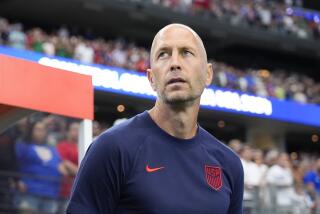There Is No Scoffing at Argentina’s Triumph : World Cup Victory Takes Some of the Taint Off Controversial 1978 Decision
- Share via
MEXICO CITY — For the next four years, Argentina has the right to call itself the world soccer champion.
It is a right that was earned here Sunday afternoon, when Argentina defeated West Germany, 3-2, in the final match of the 1986 World Cup.
The victory caused Argentines worldwide to celebrate, international soccer supremacy being a source of national pride. Some of the fans’ enthusiasm, however, was surely because this time the Argentine victory is largely untainted.
That, according to reports published during the tournament, was not the case in 1978, when Argentina won its first World Cup. Then it was more a matter of literally buying the victory rather than earning it.
On June 22, the day Argentina played England in the quarterfinals, The Times of London published a story in which it stated that the military government in Argentina bribed Peru to throw a vital game during the 1978 competition, which was played in Argentina.
According to The Times, Argentina shipped 35,000 tons of free grain to the Peruvian port of Callao, and its central bank agreed to unfreeze a $50-million line of credit for Peru.
In return, the Peruvian national team was to purposely lose to Argentina by at least four goals in order for Argentina to advance to the championship game at the expense of Brazil.
The final score was Argentina 6, Peru 0.
There were all sorts of charges leveled at the time, including the ludicrous one by several Argentine newspapers that claimed the Brazilians had tried to offer Peru money to play well .
Despite claims of bribery, nothing was ever proven and the matter did not resurface again until The Times’ article 10 days ago. The newspaper said its sources for the information were a former senior Argentine civil servant and two soccer officials.
It said money from a secret account held by the Argentine Navy was paid to Peruvian officials and players, with the details contained in documents held by the Argentine central bank. The Times said it had inspected those documents.
In addition to the bribery, which The Times of London said the military junta had resorted to in an effort to boost its popularity, the newspaper also stated that several Argentine players had been using powerful amphetamines during the 1978 World Cup but succeeded in avoiding drug tests.
Reaction to The Times’ article in Mexico was muted, the general feeling being that the newspaper had merely confirmed what had been long and widely suspected.
Only one member of the 1978 team, former captain Daniel Passarella, is on the 1986 team, but he fell victim to an intestinal problem before the tournament began and did not play.
All the same, the Argentine team did not win the World Cup without getting into any controversies.
For one thing, its 46-year-old coach, Carlos Bilardo, kept up a running battle with his predecessor, Cesar Luis Menotti, the man who led Argentina to its 1978 win. The two are bitter enemies and have frequently attacked each other’s intellect, personal behavior and coaching ability.
It did not help that Menotti was here as a journalist, filing daily reports to Argentina that could not possibly have been models of objectivity. It was Menotti, for example, who once called Bilardo “an intellectual dwarf,” and Bilardo, a medical doctor, responded in kind.
Then, too, there was the great hand-ball controversy over Diego Maradona’s first goal in Argentina’s 2-1 win over England. Television replays clearly showed that Maradona incorporated a volleyball move into his already extensive repertory of tricks, spiking the ball into the English net with his forearm.
“It was (scored by) God’s hand and Diego’s head,” Maradona laughed afterward, but the illegal goal--allowed to stand by the referee--did nothing to help either Maradona’s or Argentina’s reputation.
On balance, though, Argentina deserved its World Cup. France and Denmark were more attractive teams to watch and Brazil had its moments, but Bilardo’s squad played like a team.
Heavily criticized by the Argentine media before coming to Mexico, Bilardo somehow found a way to get his players to believe in themselves and in him. He has a strong, young team that can only improve in the four years leading up to the defense of its title in Italy in 1990.
Maradona, the team captain, is only 25 and already has stated his intention of returning to the World Cup stage in four summers’ time. It is quite possible that before then there will be two Maradonas on the Argentine team. Diego’s brother, Hugo, 16, is rapidly making a name for himself and could soon be called by Bilardo.
With previous discoveries such as Jorge Burruchaga, Sergio Batista, Oscar Ruggeri and Jose Cuciuffo having proved their worth in Mexico, and with other talents such as Luis Islas and Claudio Borghi eager to do so, Bilardo can only be looking forward to the future.
When asked last week whether Argentina’s success would allow him now to respond to the criticism that had come his way, he declined.
“I was taught never to look back, and that’s something I have transmitted to my players,” he said. “Our country is never going to get itself together if we insist on looking back.”
He was not necessarily referring to what happened in 1978, but it applies. The task of the 1986 champions is clear: They have to undo the damage that was done before.
They have Argentina’s reputation to restore. Already, they have made a promising start.






